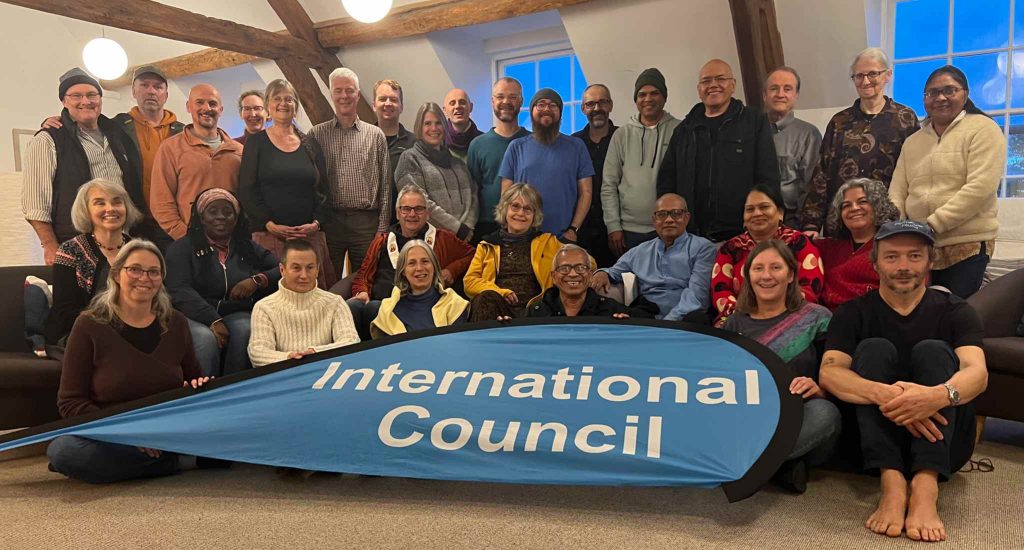The Lineage of responsibility
How can we support the spiritual and leadership development of those who occupy - or will occupy – positions of responsibility within Triratna? More info belowIntroduction
In 2022 the International Council (IC) agreed nine strategic priorities. The April 2023 IC online meeting will explore the first of these – the lineage of responsibility (an important aspect of this strategic priority relates to how, and by whom, decisions are made within Triratna – an important and significant topic that will be explored separately)
Taking responsibility within our community provides a unique opportunity for intense spiritual practice and growth. It can be approached as bodhisattva activity! However, spiritual inspiration and goodwill alone are not enough. Those who give to Triratna and the Dharma in this way need to be appropriately resourced to fulfil their responsibilities confidently, competently, and sustainably. They need clear mandates to exercise agency in relation to their roles, and to do this there needs to be a broadly agreed decision-making model or process so that decisions, and the actions that flow from them, can be progressed unhindered. In addition to the above, Triratna needs a succession pipeline – a means of maintaining and strengthening the lineage of responsibility – so that it has the best chance of surviving and thriving in the future.

Arthavadin: International Council Convenor
During the April online meeting we sought to answer:
How can we support the spiritual and leadership development of those who occupy – or will occupy – positions of responsibility within Triratna?
Preparation
Please watch these videos from Aryajaya and Danayutta to stimulate your thinking prior to the meeting. We won’t be showing these videos during the meeting.
Day One
Jnanadhara opened the first day of the April 2023 International Council Meeting with a brief ritual connecting those present with right view and kalyana mitrata. Arthavadin welcomed everyone before reiterating the importance of the issue that the meeting is seeking to address. Members and guests met with others from different Areas and Strands to reflect on personal experiences of taking responsibility. Everyone was invited to answer the following:
- give a brief history of when, where, how and why you have taken responsibility or led a project/situation – both inside and outside Triratna
- what conditions – both internal and external – enabled you to take responsibility/lead a project/situation in Triratna?
- what conditions – both internal and external – hindered taking responsibility/leading a project/situation in Triratna
- how has taking responsibility/leading a project/situation impacted on your spiritual life – for better and/or for worse?
- do you think/feel that the lineage of responsibility in Triratna is, or could be, a means of spiritual development. If yes, then why and how?
Key threads and themes identified within each group were fed back and recorded at a plenary.
Introductions: and why we think this issue is important
Plenary: from session 1
Introductions: and why we think this issue is important
Plenary: from session 2
Day Two
During the second day of the meeting members and guests met in different groupings to creatively explore ways of:
- encouraging, developing, and supporting individuals to take responsibility and lead projects/situations in Triratna
- creating a culture where taking responsibility and leading projects/situations is regarded as an attractive and desirable opportunity
- ensuring that the path of responsibility is undertaken and experienced a genuinely spiritual path
Key threads and themes identified within each group were fed back and recorded at a plenary.

Plenary from session 1
Plenary from session 2
Day Three
On the final day of the meeting members and guests met to translate the ideas they generated over the previous two days into pragmatic ‘radically do-able’ actions, initiatives, and projects.
The key ideas identified by each group were fed back and recorded at a plenary. These may be subsequently written up into a brief report and will, after a process of assessment, be considered for adoption (and/or promotion) by the International Council.

Plenary from session 1
Plenary from session 2
